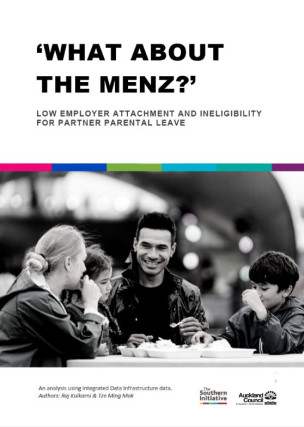May 2022 | Reports
In 2018-19, the Social Wellbeing Agency worked with The Southern Initiative to explore the benefits of combining data, science, and lived experience – specifically looking at contributing to child, youth and family wellbeing in South Auckland. With this work, we wanted to better understand the conditions of prolonged cumulative stress South Auckland whānau were experiencing around the birth of a child, and identify what might help keep whanau strong and resilient. We published a case study summarising those findings here.
In 2021, with The Southern Initiative, we carried out further analysis looking at a cohort of 53,000 new fathers. We investigated how income and occupation affected people's ability to take time off – as indicated by dips in income around the time of birth. We also estimated how many dads were eligible for parental leave when their baby is born, measured by their length of attachment to their main employer.
The key findings are:
- Income ‘dips’ in general appear to be a sign of being able to afford time off work.
- High income dads can afford to take the most unpaid time off around a baby’s birth.
- The very lowest income dads are motivated to enter the workforce to start earning more money around the time of birth – they don’t have ‘dips’ and their income only increases from point of birth.
- Low-to-middle income dads try to earn more in the leadup to birth, to be able to afford to take unpaid time off around baby’s arrival, but return to work fairly quickly.
- Māori and Pasifika dads, despite low average income, don’t follow the pattern of returning to work quickly on average.
- There are some signs that Māori dads in the most precarious occupational groups are more likely to ‘work through’ the birth month.
The work has been shared with relevant government agencies, and The Southern Initiative have published the report here.(external link)The views and recommendations in the report are those of The Southern Initiative.
